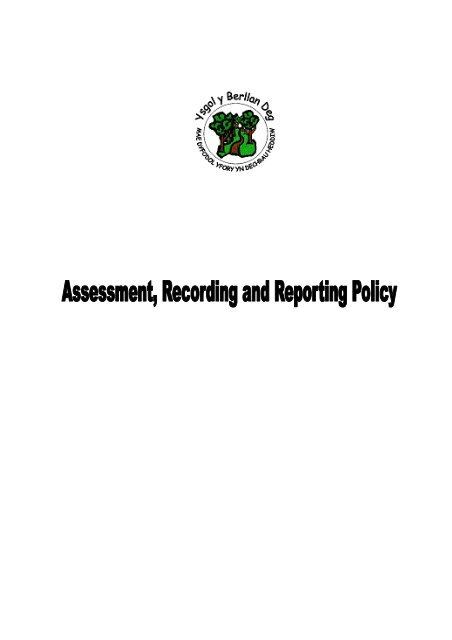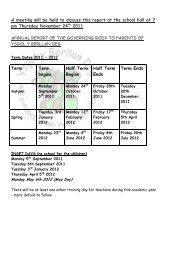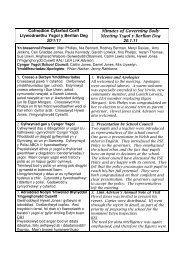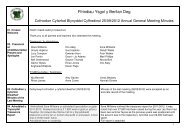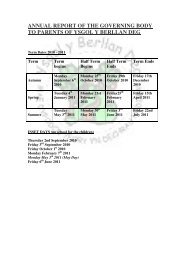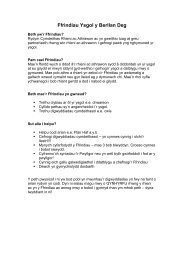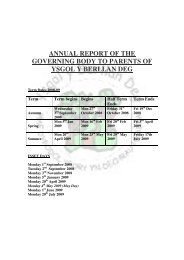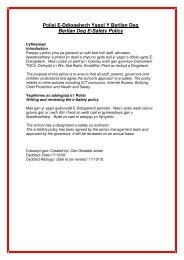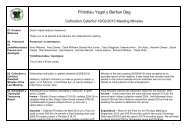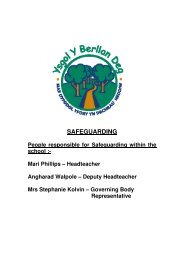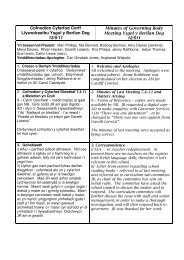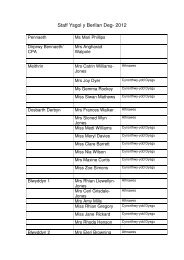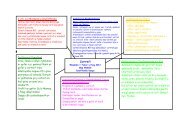Untitled - Ysgol y Berllan Deg
Untitled - Ysgol y Berllan Deg
Untitled - Ysgol y Berllan Deg
You also want an ePaper? Increase the reach of your titles
YUMPU automatically turns print PDFs into web optimized ePapers that Google loves.
Assessment, Recording and Reporting PolicyIntroductionAt <strong>Ysgol</strong> y <strong>Berllan</strong> <strong>Deg</strong> we believe that effective assessment is at the centre of teachingand learning and we make use of different strategies to support the staff to increase theirknowledge of every pupil. Assessment develops an understanding of the pupils’ strengthsand areas for further development and this information is used to help every pupil to makeprogress. We believe that every pupil has the potential to improve and to reach their fullpotential according to their age/stage.Principals and AimsOur main aim is to improve our pupils learning by producing learners who are active intheir own learning. We aim to achieve this by:• Sharing learning objectives with learners – NAIN (WALT – we are learning to);• Involving learners in self assessment – WILF - What I’m looking for;• Providing feedback, which leads to learners recognising their next steps, bringingabout future improvement e.g. 2 stars and a wish and other written and verbalfeedback;• Having the confidence and expectation that all our learners can improve;• Making and recording judgements so that future activities can be properly matchedto individual learners’ needs e.g. field notes;• Diagnosing particular difficulties the learners are encountering e.g. field notes;• Motivating our learners e.g. various strategies;• Aiding learner transfer between classes and key stages e.g. field notes;• making judgements about the nature and quality of learners work e.g. field notesand moderation;• reporting progress and achievement to parents, learners, colleagues, governors(where appropriate) and relevant outside agencies e.g. field notes;• monitoring trends in whole school performance and effectiveness e.g. analysis ofdata.We aim to foster ‘Assessment for Learning’ but we also recognise the need for summativeassessment because they fulfil different, parallel purposes.“We need to clearly differentiate between assessing learning for the purpose of rewardinggrades and forming reports, with its order well established, and assessment for learning,which has different priorities, new arrangements and another level of engagement.”Assessment Reform GroupWe base our planning on National Curriculum Programmes of Study, Contexts forLearning and upon having a detailed knowledge of our learners. We provide regularreports on progress so that learners, teachers and parents strive to work together toimprove learning and teaching across the school. We recognise that any assessmentundertaken at <strong>Ysgol</strong> y <strong>Berllan</strong> <strong>Deg</strong> is intended to have a strong influence on themotivation and self-esteem of our learners.
Assessment Action PlanIn order to turn policy and principles into practice the school has an action plan forassessment, recording and reporting across the whole school curriculum.Roles and responsibilitiesClass teachers will:• provide a supportive environment where assessment can be carried out withoutdamaging self-esteem;• provide clear planning and share learning objectives with learners – NAIN (WALT);• use assessment information to inform planning. Planning to include NAIN and‘What I’m looking for’ and strategies to enhance AfL and thinking skills;• provide on-going assessment - field notes;• provide constructive feedback to learners - oral and written comments;• report to parents on learner’s progress, attainment and next steps - field notes;• set individual targets for improvement with learners – setting targets to share withparents at the beginning of the school year, IEPs and IBPs where appropriate;• carry out school based tests and statutory assessments;• record significant progress, above or below average - field notes;• use the agreed range of assessment methods and techniques to gather and useinformation in line with school policies - using pupil tracker;• ensure that information is transferred to the receiving teacher/school in line withpolicy;• identify learners in need of extra support and liaise with the SENCo to write IEP’sor IBP’s.The SENCo will:• provide a supportive environment where assessment can be carried out withoutdamaging self-esteem or motivation;• liaise closely with class teachers and ARR subject leader;• monitor learners’ progress against their IEP’s and IBP’s;• undertake specific assessment tasks as required;• liaise with external agencies;• undertake formal assessments for statements; and• use the pupil tracker as a base to form judgements about the impact interventionstrategies have had on a learner’s attainment.Subject co-ordinators will:• ensure the curriculum planning and opportunities for assessment are of goodquality;• monitor their subject to ensure assessment informs learning and teaching – In KS1and 2 learning objectives (NAIN) usually come from the National Curriculum
programme of study and success criteria (WILF) are influenced by theexpectations in the level descriptions. In the Foundation Stage WILF may beinfluenced by the desirable learning outcomes.• monitor levels of attainment and standards - field notes;• monitor the adequacy and use of resources;• ensure that all learners receive their statutory entitlement to the curriculum (overfour years in KS2, over 2 years in KS1) with appropriate opportunities for buildingupon skill development;• use all available data to make changes to learning and teaching as required;• interpret and analyse data to produce an annual overview and set targets for futureimprovement;• report to the Head teacher and governors on standards and SIP as appropriate;• identify own CPD needs and those of others in relation to subject skills andknowledge;• moderate samples of work from across the primary phase to ensure consistency,progression and appropriate level of challenge. These are to be kept and added toas part of staff INSET;• evaluate the standards of learners work against wider school, LEA or nationalstandards in the subject.The ARR subject co-ordinator will:• ensure policies are up to date, regularly reviewed and consistent with each other;• disseminate information and ensure training and support for colleagues;• generate an Action Plan in line with SIP;• liaise with other subject leaders to ensure coherence;• make ARR procedures clear to all colleagues and ensure they are followed andused consistently;• set timetable for assessment cycle;• determine means for setting standards throughout the school;• provide staff development opportunities for INSET sessions;• support colleagues in identifying assessment opportunities and in using allavailable data;• collate assessment data to inform school target setting;• ensure portfolios are generated and standards agreed;• rationalise assessment systems to ensure manageability; and• monitor all ARR procedures and practice.The headteacher and leadership team will:• ensure the school meets the statutory requirements;• agree statutory whole school targets;• measure the school’s performance against LA targets, national benchmarks andthe improvements made by each intake of learners;
• identify variations between performance of different groups of learners andrespond accordingly (FFT data analysis and Pupil Tracker);• monitor quality of ARR procedures;• define the role of subject leaders;• act on any specific staff development issues;• allocate financial resources ensuring value for money.In addition core subject leaders will:• discuss NFER papers with the staff to identify areas of strength, areas for furtherdevelopment and implications for learning and teaching;• compare school performance with national, county and similar school standards inKS 1 and 2;• compare the performance of identified groups of learners within the school (e.g. bygender, SEN provision).The governing body will:• agree statutory targets;• agree SIP;• approve ARR policy – curriculum sub-comittee;• the SEN governor will liaise with head teacher and SENCo; and• liaise with subject co-ordinators.Equal opportunities and racial equalityAssessment procedures are undertaken equally with all learners regardless of gender,race, socio-economic or cultural background. All staff make balanced judgements oflearner attainment.The school is committed to working towards racial equality, promoting positiveapproaches to difference and fostering respect for people of all cultural backgrounds.Developing positive relationships between learners of all backgrounds is an essentialaspect of the Assessment Policy, and staff are committed to ensuring that all learnersachieve the highest possible standards in an inclusive environment.Assessment timetableThe following assessment is on-going: (AfL) planning/clear NAIN and WILF; marking/evaluation - using field note sheets; Self assessment strategies e.g. traffic lights, thumbs up/down; Feedback – Two stars and a wish; moderation; and
monitoring.A copy of the Annual Cycle of Assessment has been given to all staff and is displayed ina central location. (See copies at end of policy)Field notesIndividual field notes are kept for:• Welsh (oracy, reading and writing) - to inform individual pupil target setting and ensureappropriate degree of challenge;• English (oracy, reading and writing) - to inform individual pupil target setting andensure appropriate degree of challenge;• Mathematics - to inform individual pupil target setting and ensure appropriate degreeof challenge;• Science - to inform individual pupil target setting and ensure appropriate degree ofchallenge; and• P.S.E – for general comments and linked to skills and PSE frameworks. They will alsoshow additional interests/involvements that learners have within school.The foundation field note sheets are used for groups of learners to:• evaluate learning – significant under/over achievement;• ensure appropriate level of challenge;• ensure progression;• form judgements when writing reports at the end of the academic year;• help form judgements at end of the KS; and• highlight areas for development (staff and learners) within subjects for CurriculumLeadersField notes will be kept in a separate orange Assessment file from class planning files andwill contain; individual PSE notes; individual Welsh notes; individual English notes; individual Maths notes; individual Science notes; and group foundation subject notes.Planning for AssessmentWe use our Curriculum Overview and National Curriculum subject orders to guide ourteaching. Schemes of Work are used to support teachers when necessary.We plan our lessons with clear learning objectives. These are shared with the learnersand written on the board every lesson (NAIN). Teachers share the success criteria forthat learning objective with learners (WILF). Learners are also encouraged to determinetheir own success criteria. The success criteria is used for all assessments carried out in
that lesson. Planning takes into account the differences of abilities and aptitudes ofindividual learners. Activities are differentiated by task and outcome, resources andsupport. This careful planning includes focus on opportunities to make progress.Short-term lesson plans recognise the needs and abilities within the class and theplanning reflects the variety of assessment methods that could be used for each activitysuch as questioning, discussion, marking, observation and focused assessment.The field notes are used to inform future learning and teaching and to ensure anappropriate level of challenge. Significant under or over achievement can be identifiedand will inform planning in subsequent lessons. Field notes become a record of theprogress made by the class.Feedback and marking (Assessment for Learning)We recognise the immense impact feedback has on learner self-esteem and motivationbecause it tells them how well they have done and what they need to do next to improvetheir work. We have an agreed policy for marking that enables us to promote consistencyand feedback. Learners are given verbal feedback whenever possible and comments arewritten, where appropriate, on the learner’s work during marking. These comments arerelated to the learning objective, identifying strengths and areas to develop further.Written comments are given to all learners (age appropriate). Time is provided forlearners to read and follow up on these comments e.g. at the start of lessons, in order toimprove future attainment. This ensures that the time teachers spend marking really hasan impact on learners work. Learners are encouraged to initial the comments to showthey have been read in Years 5 and 6 and to improve their work accordingly.Self evaluation/assessment (Assessment for Learning)Learners are encouraged to evaluate their own work and that of their peers. We believethat pupil self-evaluation should be encouraged as soon as learners display sufficientmaturity to become involved. We are aware that our learners need time to develop theseskills as they progress throughout the school. This process is started in year 1 and aimsto gradually provide learners with the skills to become competent and active in selfevaluation.We believe this part of the assessment process is paramount in producinglearners who are active in their own learning. They can reflect on how well they havedone in relation to the learning objective. Self assessment responses may take placeindividually, in pairs, in groups or in a whole class situation. The learners are encouragedto use a system of traffic lights in KS2 or smiley faces in KS1 to indicate theirunderstanding in their books.Provision for more able and talented learnersAt <strong>Ysgol</strong> y <strong>Berllan</strong> <strong>Deg</strong> we recognise that we have more able and talented children andwe aim to make early identification and address specific skills and talents. Assessment,
observations and discussions are used to inform the staff and differentiated tasks andvarious opportunities to learn and strategies are used to meet their needs.Provision for learners with special educational needs(See SEN policy for further information)Individual targets are set for all SEN learners (where appropriate) in the form of an IEP orIBP. These targets are monitored and reviewed termly in consultation with the learnersand their parents by the SENCo.RecordingThe following record keeping system is in place at <strong>Ysgol</strong> y <strong>Berllan</strong> <strong>Deg</strong>. It aims to bemanageable, consistent and coherent. The information necessary to inform teaching andlearning will be retained as follows: attendance register (legal requirement); curriculum overview and short-term planning formats; baseline assessments - kept in Class Data File; end of KS1 and KS2 statutory assessments - kept in Class Data File; a record of all LA tests – kept in Class Data File individual pupil reports – kept in individual files; IEPs and IBPs – kept in individual files; a sample of learners books; focused assessment – comments in red on field notes sheets for Welsh, English,Mathematics, Science; subject portfolios; spelling test records – EPT and Class Data File; reading test records – EPT and Class Data File; evaluations of NFER English and mathematics results to inform planning – EPT; guided group reading records; home/school reading records; and supported field notes – individual and group.Assessment class files (orange)The assessment class file has been devised to aid teachers with assessment procedures.Each file contains: ARR policy; assessment cycle; marking and feedback policy; current information e.g. data from assessments – spelling, reading, CAN field notes.Moderation and consistencySubject portfolios
Parental consultationsParents are encouraged to become involved in their child’s learning and development.The staff welcome the opportunity to discuss their child’s progress on an appointmentbasis. Our parents are offered the opportunity to meet their child’s teacher in the autumnand spring terms at Parents Evenings. If the learner is on the SEN register, the parentsare offered to meet the SENCo also. At the first meeting of the school year we discusshow s/he has settled into their new class and also any areas of difficulty we may haveidentified. Individual targets are given and discussed in Language, Mathematics and ageneral target which the parents sign. At the second meeting of the year we evaluatetheir child’s progress. During the summer term reports are sent to inform the parents oftheir child’s progress with an invitation to discuss the report with teachers about anyconcerns they may have.Statutory assessment, testing and the analysis of test dataAll reception pupils will undergo baseline assessment during their first half term in schooland the results from this are used alongside Teacher Assessments to support our overallfuture target setting as a school and for individual pupils. For the baseline assessmentthe class teacher will draw on a wide variety of evidence sources to make the appropriatejudgements.Learners in Key Stage 2 will undertake the Glannau Menai and Schonnell Single WordSpelling Test. Learners from year 1 to year 6 will undertake the CAN mathematics test.LEA tests will also be carried out when required which are the Reading tests in Welsh andEnglish and the Non-Verbal test for learners in Year 3 and 6, with Years 3 to 6 alsoundertaking the NFER English Tests. Learners in Year 3 also undertake the EdinburghPicture Test during the Autumn Term. Learners in years 4 and 5 will undertake NFERMathematics Tests in the Summer Term. Some diagnostic testing may be undertaken bythe class teacher, SENCo or outside agencies, where this is appropriate to the individuallearner.Learners at the end of KS 1 and 2 will undertake statutory teacher assessment. TheTeacher Assessments made at the end of KS 1 and 2 are analysed by the core subjectleaders/SLT. The analysis will compare the performance of the individual subjects,gender performance, performance against benchmark schools and performance againstLEA and national average. These analyses will become part of the subject action planand therefore part of the SIP.Tracking individual learnersWe have a system in place for tracking individual learners.The head teacher and all staff will use the predictions calculated by the LEA to setexpected targets for all pupils at the end of the KS. The pupil tracker is used to trackprogress in Welsh and English writing, Mathematics and Science. CAN, spelling age and
eading age data is also entered as are any intervention strategies learners have hadaccess to. This data is analysed by class teachers, ARR coordinator, SENCo and SLT tomeasure the impact these interventions have had on learning and to monitor progressionacross the school.Transfer of informationAll agreed transfer information is passed to the receiving teacher by the end of theacademic year. If a learner leaves the school the school will forward the appropriaterecords to the new school. This information is shared with the SENCo and all supportstaff.There are relevant transfer arrangements with receiving schools when learners transfer toKS 3. Liaison takes place with receiving staff and we actively take part in the KS2/3transition activities. The emphasis is on making the transfer process as seamless aspossible.Monitoring and reviewThe headteacher and ARR subject leader are responsible for monitoring theimplementation of this policy. They liaise with all subject leaders when monitoring theirsubject. The subject leader will compile an annual strategic overview for ARR to identifystrengths and areas for future development. The ARR subject leader will also beresponsible for answering Key Question 2.


